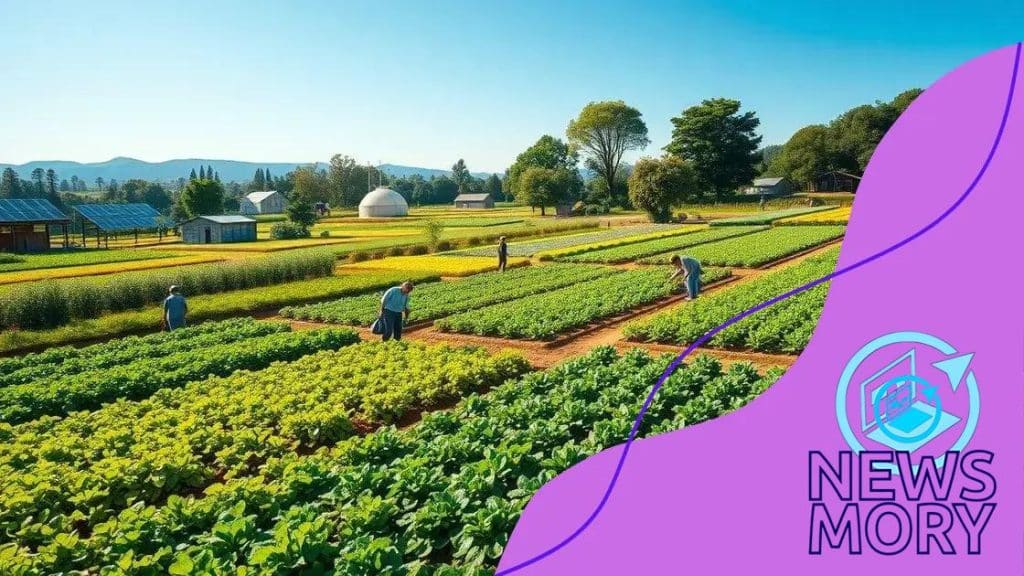Investing in sustainable agriculture for long-term returns

Anúncios
Investing in sustainable agriculture offers long-term returns through enhanced productivity, better resource management, and growing consumer demand for eco-friendly products, despite challenges like initial costs and market uncertainties.
Investing in sustainable agriculture for long-term returns is becoming increasingly vital. But what does this really mean for farmers and investors alike? Let’s dive into how this approach can yield fruitful benefits.
Anúncios
Understanding sustainable agriculture benefits
Understanding sustainable agriculture benefits is crucial for farmers and investors alike. This approach not only supports the environment but also promotes economic stability and resilience in farming practices.
Sustainable agriculture focuses on techniques that enhance productivity while preserving natural resources. By utilizing practices that are environmentally friendly, farmers can create healthier ecosystems. This leads to a greater diversity of crops, which can increase yields.
Key Advantages of Sustainable Agriculture
Investing in sustainable methods brings several benefits:
Anúncios
- Improved soil health: Using cover crops and reduced tillage can restore and improve soil quality.
- Water conservation: Techniques such as drip irrigation and rainwater harvesting help in efficiently using water resources.
- Pest management: Fewer chemicals mean less environmental impact and healthier crops.
Additionally, sustainable agriculture can create a stable market by focusing on local production. Local sourcing decreases transportation costs and provides consumers with fresh produce, creating a win-win situation.
Economic Sustainability
Investing in sustainable agriculture can also have long-term economic benefits. While initial costs may be higher due to transitioning practices, the overall savings in inputs such as fertilizers and pesticides can be significant.
Moreover, consumers are increasingly seeking organic and sustainably produced foods. This shift in consumer preference can boost profits for those who adapt to sustainable methods.
Understanding these benefits helps in making informed decisions about farming and investment strategies. Fostering a sustainable approach is not just good for the earth; it is a smart financial move.
Key practices for sustainable farming
To ensure success, key practices for sustainable farming are essential. These methods not only enhance productivity but also protect the environment. Understanding these practices can lead to better farming outcomes and a healthier planet.
Important Sustainable Farming Techniques
Here are some effective practices:
- Crop rotation: Changing the types of crops grown in a specific area helps prevent soil depletion and control pests.
- Organic fertilizers: Using compost and natural amendments improves soil health without harmful chemicals.
- Cover cropping: Growing cover crops protects soil from erosion and enhances its fertility by adding nutrients.
Implementing these techniques can also improve water management. By utilizing methods like drip irrigation, farmers can significantly reduce water waste while maintaining healthy crops. Moreover, integrating agroforestry can be a game changer.
In agroforestry, trees and shrubs are grown alongside crops. This increases biodiversity and creates habitats for wildlife, which can naturally manage pests. Farmers see not only immediate benefits but also long-lasting impacts on their environment.
Community and Education
Another key aspect involves engaging with the community. Farmers can share knowledge and learn from one another, creating a support network for sustainable practices. Workshops and local farming groups encourage collaboration and innovation.
Sustainable farming also emphasizes the importance of education. By understanding the science behind these practices, farmers can make informed decisions. This leads to a more productive and sustainable future for all.
Long-term returns of sustainable investments

The long-term returns of sustainable investments are becoming increasingly relevant as investors seek strategies that not only promise financial gains but also contribute positively to the planet. These investments focus on businesses and practices that prioritize sustainability and environmental impact.
Research shows that sustainable investments can perform just as well, or even better, than traditional investments. Investors are increasingly recognizing that companies committed to sustainability tend to be more resilient in the face of market fluctuations. For instance, many sustainable companies showcase strong governance and risk management practices, which can translate into stability and profitability.
Financial Benefits of Sustainable Investing
Investors can expect several financial benefits from sustainable investments:
- Higher demand: As consumers increasingly prefer eco-friendly products and services, businesses that focus on sustainability are likely to see higher sales.
- Cost savings: Sustainable practices often lead to reduced energy and resource costs, allowing companies to increase their profit margins.
- Access to new markets: Companies committed to sustainability can attract investment from niche markets and attract customers looking for responsible options.
Beyond immediate financial gains, sustainable investments can lead to significant long-term value creation. Companies focusing on environmental, social, and governance (ESG) factors often enjoy better reputations and long-lasting customer loyalty. This loyalty can translate into steady revenue streams over time.
The Impact of Regulations and Trends
The rising tide of regulations promoting sustainability and corporate responsibility is also driving the attractiveness of these investments. Governments around the world are increasingly implementing policies encouraging sustainable practices, which can create robust opportunities for growth.
Furthermore, investor preferences are shifting. Younger investors, in particular, show a preference for sustainable investments, which can shape market trends and push companies toward sustainable practices. By aligning investment strategies with these values, investors can not only seek returns but also make a positive impact.
Challenges in sustainable agriculture investment
Investing in sustainable agriculture presents numerous challenges that can affect investors and farmers alike. Understanding these challenges is crucial for anyone looking to engage in this field.
One main hurdle is the initial costs associated with transitioning to sustainable practices. Farmers often face higher expenses when implementing new technologies or organic methods. These costs can deter potential investments, especially for smaller farms.
Market Uncertainty
Market dynamics also introduce uncertainty. Sustainable products may not always have a guaranteed market or price, leading to risks for investors. Demand for sustainable goods is growing, but fluctuations in consumer interest can still impact profitability.
- Regulatory changes: Governments can impose new regulations unexpectedly, which may require additional investments or adjustments.
- Competition: Traditional agriculture often benefits from established practices, making it challenging for sustainable methods to compete on price.
- Dependency on weather conditions: Climate change can affect crop yields unpredictably, altering the risk profile for agricultural investments.
In addition to economic factors, there may be a lack of knowledge and resources in sustainable practices. Not all farmers have access to the necessary training or information to transition effectively. This gap can hinder the adoption of sustainable farming techniques.
Long-Term Commitment
Sustainable agriculture also requires a long-term commitment. Investors may be hesitant to allocate funds if they seek short-term gains. Sustainable practices often take time to show significant financial returns, which can be a barrier for some.
Despite these challenges, awareness and education are increasing. Many organizations offer resources and support to help overcome these obstacles. By understanding these hurdles, stakeholders can better navigate the complex world of sustainable agriculture investments.
Future trends in sustainable farming
The future trends in sustainable farming are set to revolutionize the agriculture industry. As global awareness of climate changes and environmental impacts increases, innovative methods are emerging to improve practices.
Technology plays a crucial role in shaping these trends. For example, precision agriculture uses data and technology to optimize farming practices. This includes employing sensors and drones to monitor crop health and soil conditions. By using these tools, farmers can make informed decisions, leading to increased efficiency and reduced waste.
Organic Farming Growth
There is also a growing demand for organic farming methods. Consumers increasingly prefer food that is grown without synthetic pesticides and fertilizers. This shift is prompting farmers to adopt organic practices, which can enhance soil health and biodiversity.
- Regenerative agriculture: Focuses on rebuilding soil health and restoring ecosystems.
- Vertical farming: Involves growing crops in stacked layers, maximizing space and minimizing land use.
- Hydroponics and aquaponics: These soilless farming methods are becoming popular for their efficient use of water and space.
Another trend is the utilization of sustainable energy sources such as solar power. Farmers are investing in renewable energy technologies to reduce reliance on fossil fuels. This not only lowers operational costs but also supports wider sustainability goals.
Consumer Engagement and Education
Increased consumer awareness is driving demand for transparency in food production. Farmers who can show their commitment to sustainable practices are likely to connect better with customers. Education about sustainable methods is essential for farmers seeking to adapt to these demands.
Future policies and incentives are also expected to support sustainable farming. Governments may implement programs to reward farmers for environmentally friendly practices. As these trends evolve, they will shape the future landscape of agriculture, promoting a balance between productivity and ecological stewardship.
As we look towards the future, sustainable agriculture promises to be vital for both the environment and our economy. By adopting innovative practices, farmers can boost productivity while preserving natural resources. This shift not only meets the growing demand for sustainable products but also provides long-term benefits for communities and ecosystems. Embracing these trends will help farmers navigate challenges and create a more resilient agricultural landscape. Together, we can foster a greener future.
FAQ – Frequently Asked Questions about Sustainable Agriculture Investments
What are the benefits of sustainable agriculture?
Sustainable agriculture improves soil health, conserves water, and promotes biodiversity while meeting consumer demand for eco-friendly products.
What challenges do farmers face when transitioning to sustainable practices?
Farmers often encounter high initial costs, market uncertainties, and a lack of knowledge or resources about sustainable methods.
How does technology impact sustainable farming?
Technology enhances sustainable farming through precision agriculture, using data to make informed decisions that increase efficiency and reduce waste.
Why is consumer education important in sustainable farming?
Educated consumers are more likely to support sustainable products, driving demand and encouraging more farmers to adopt eco-friendly practices.





